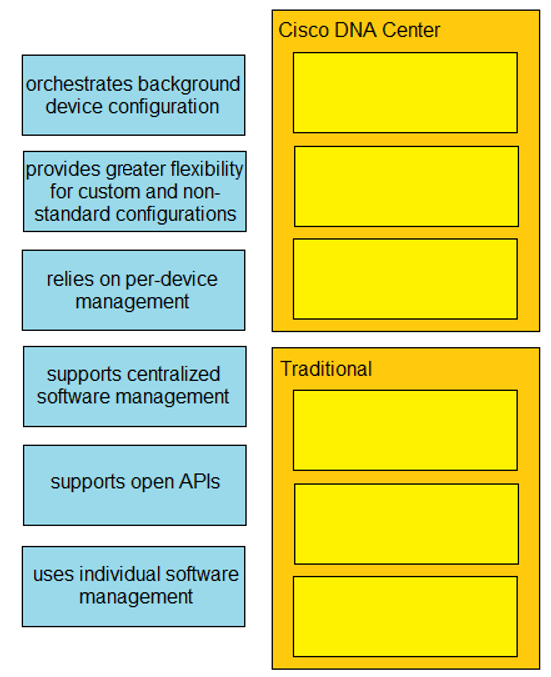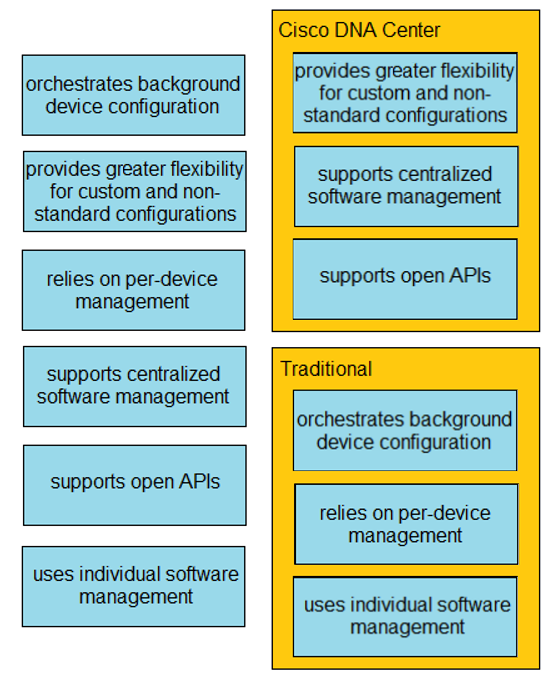DRAG DROP -
Drag and drop each characteristic of device-management technologies from the left onto the deployment type on the right.
Select and Place:

DRAG DROP -
Drag and drop each characteristic of device-management technologies from the left onto the deployment type on the right.
Select and Place:


I think orchestra background device configuration is not true to Tradition network
I believe that Orchestration and support for custom and non-standard configs should be swapped.
Given answer is wrong. "orchestrate bakground config" have to be swapped with "provide greater flexibility for custom and non-standard config" because each device is managed individually, there’s more flexibility for custom configurations. However, this can also lead to inconsistencies and errors due to the lack of centralized control and automation.
Should be: Cisco DNA Orchestrates Provides greater flexibility Support centralized Traditional: relies on per-device support open API ( Openflow es) uses individual software management
Support API is SDN (DNA Center with NBI)
Cisco DNA doesn't support open API's. Their APIs are private, internal or proprietary. Open APIs are published and you can make your own web applications with them. That's how things have traditionally been done with Web API, for example. Traditional -relies on per-device management -supports open APIs (non-private) -uses individual software management Cisco DNA Center -orchestrates background device configuration -provides greater flexibility for custom and non-standard configurations -supports centralized software management
i think cisco dns support open api can you check this https://community.cisco.com/t5/controllers/cisco-dna-center-openapi/td-p/4717032
The feature of orchestrating background device configuration is specific to Cisco DNA Center. Cisco DNA Center is a network management and automation platform that provides centralized control, automation, and analytics for network infrastructure. With Cisco DNA Center, administrators can automate the configuration and provisioning of network devices in the background. This includes tasks such as deploying configurations, pushing software updates, Providing greater flexibility for a custom and non-standard configuration is a feature that is more commonly associated with traditional network configuration approaches rather than Cisco DNA Center. In traditional network configuration, administrators have more flexibility and control over customizing and implementing non-standard configurations. They can manually configure network devices using command-line interfaces (CLIs) or device-specific configuration interfaces. This allows them to
I gree! ***Cisco DNA Center*** - orchestrates the configuration of background device. - supports management centralized software. - supports open APIs. ***Traditional*** - provides greater flexibility for settings custom and non-standard. - depends on management per device. - use software management individual.
Belong to Cisco DNA Center (Software-Defined Networking Solution): Orchestrates background device configuration, streamlining the process of applying changes to multiple devices simultaneously and reducing manual configuration efforts. Provides greater flexibility for custom and non-standard configurations, allowing network administrators to tailor settings to specific requirements without being limited by rigid configurations. Supports centralized software management, enabling the deployment and updates of software across the network from a single, unified interface.
Belong to Traditional (Legacy Networking): Relies on per-device management, necessitating manual configuration adjustments for each network device individually. Uses individual software management, requiring separate installations and updates for software on each device, potentially leading to longer deployment times. May have limited support for open APIs, making it challenging to integrate with third-party applications and limiting automation possibilities compared to more modern solutions like Cisco DNA Center
GPT answer seems legit to me Cisco DNA Center: Orchestrates background device configuration: Centralized management that automates configuration. Supports centralized software management: Manages software updates and configurations from a central point. Supports open APIs: Allows integration and automation through APIs. Traditional: Provides greater flexibility for custom and non-standard configurations: Each device can be individually customized. Relies on per-device management: Configurations and management are done on a per-device basis. Uses individual software management: Software is managed separately for each device.
given answer is incorrect Cisco DNA Center -orchestrates background device configuration -provides greater flexibility for custom and non-standard configurations -supports centralized software management Traditional -relies on per-device management -supports open APIs (non-private) -uses individual software management
after researches i think that given answers are correct Cisco DNA Center offers open APIs that allow for integration with third-party systems and custom applications. This enables organizations to extend the platform's orchestration capabilities and integrate with existing tools and workflows. Traditional device management approaches typically involve manual configuration changes on individual devices, which can be labor-intensive and prone to human error. They may lack the centralized control, automation, and policy-based configuration management capabilities offered by Cisco DNA Center, making orchestration of background configurations more challenging and less efficient. https://www.cisco.com/c/en/us/td/docs/cloud-systems-management/network-automation-and-management/dna-center-platform/2-3-4/user_guide/b_dnac_platform_ug_2_3_4/b_dnac_platform_ug_2_3_4_chapter_01.html#id_76824
2 Months later, after rereading the provided answers i think the following bellow are the correct answers: Cisco DNA Center: -orchestrates background device configuration -supports centralized software management -supports open APIs Traditional: -provides greater flexibility for custom and non-standard configurations -relies on per-device management -uses individual software management (Cisco DNA provides standard configurations and Traditional provides non-standard configurations)
Appreciate your dedication to correct the answer. I always take your comments as reliable.
Orchestrates background device configuration will be Cisco DNA Center.
Network orchestration is an approach to managing and automating interactions between networks, people, devices, domains, applications, and systems within an infrastructure. This helps service providers deliver secure and quick services to their customers. So it is true for Tradition network
Even most of SDN bound with configuration policies, so it is not flexible